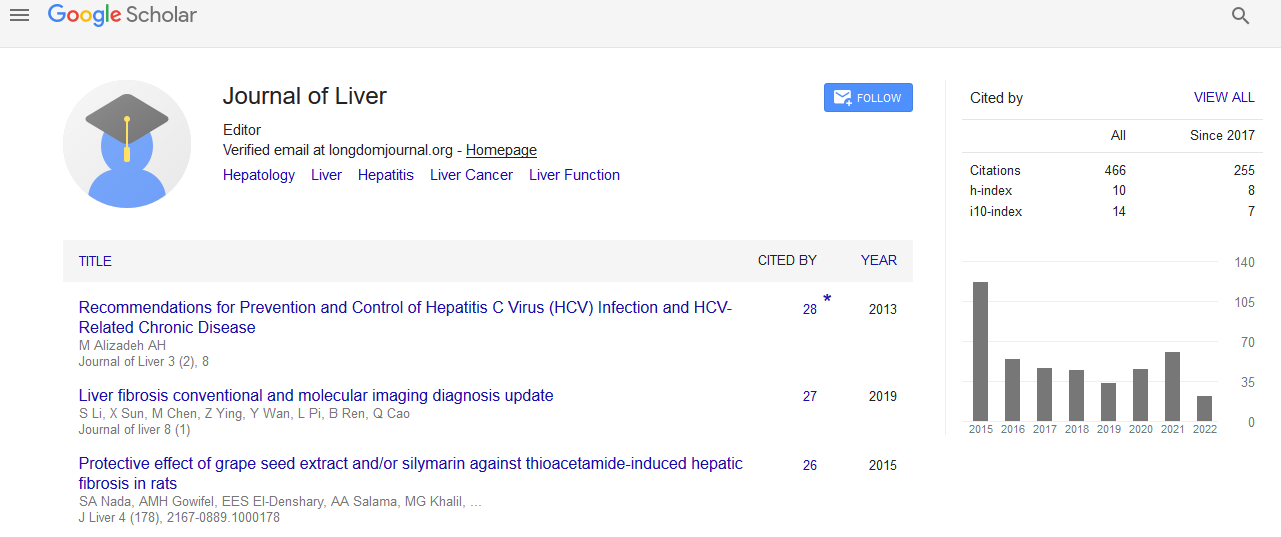PMC/PubMed Indexed Articles
Indexed In
- Open J Gate
- Genamics JournalSeek
- Academic Keys
- RefSeek
- Hamdard University
- EBSCO A-Z
- OCLC- WorldCat
- Publons
- Geneva Foundation for Medical Education and Research
- Google Scholar
Useful Links
Share This Page
Journal Flyer

Open Access Journals
- Agri and Aquaculture
- Biochemistry
- Bioinformatics & Systems Biology
- Business & Management
- Chemistry
- Clinical Sciences
- Engineering
- Food & Nutrition
- General Science
- Genetics & Molecular Biology
- Immunology & Microbiology
- Medical Sciences
- Neuroscience & Psychology
- Nursing & Health Care
- Pharmaceutical Sciences
Access time to antiviral C treatment is equal for very fragile drug users and inmates, longer for drug centers patients: Interest in having a dedicated multidisciplinary team
CO-ORGANIZED EVENT: 5th World Congress on Hepatitis & Liver Diseases & 2nd International Conference on Pancreatic Cancer & Liver Diseases
August 10-12, 2017 London, UK
Andre-Jean Remy
Perpignan Hospital, France
Scientific Tracks Abstracts: J Liver
Abstract:
Introduction: In hepatitis C, drug users and inmates are hard to screen population as well as to take over and treat. There is a common understanding that these patients have a delayed access to antiviral C treatment. French rulings published in June 10, 2016 could provide treatment by direct acting antivirals (DAA) to all these patients regardless of fibrosis stage. Since its creation in July 2013, the hepatitis mobile teams offers to all partner entities all or part of the following 15 services: 1. Training of socio-medical institutions staff with trimestral days of exchange or on-demand and on-premises; 2. Prevention information sessions toward drug users in day-care or housing structures; 3. On-site HVC HVB HIV POCT screening; 4. BOUSSOLE 5 days a week reception information and accompaniment; 5. On-premises mobile Fibroscan®; 6. Social evaluation and diagnosis by EPICES score; 7. Free biological check-up at the PASS (in case of absence of health care rights); 8. On-site specialized consultations; 9. LE FIL VERT: POCT and Fibroscan® in outdoor sites. 10. Rapid access to a close expert service called �??RCP�?� (multidisciplinary meeting), obligatory in France before treatment acesss. 11. Mobile phone lending for patients. 12. Individual sessions of therapeutic education inside an ARS (Regional Health Agency) authorized program. 13. Therapeutic support groups (nurse, psychologist, sophrologist, nutritionist). 14. Dedicated day hospital. 15. Expert patient support. Patients & Methods: The aim is to compare the average delay of access to DAA treatment in 2016 of all the patients of our centre (group 1) to the drug user patients (group 2) followed by specialised medico-social institutions (CSAPA/CAARUD), to excluded patients newly outdoor screened (group 3) with an EPICES score over 45 and inmates (group 4). The date of first contact was when the patient met the hepatitis mobile team nurse in CSAPA/CAARUD, screening date for the outdoor patients and date of detention for inmates. Was also calculated the average delay of access to RCP and the one between RCP and treatment day 0. Groups 3 and 4 patients were totally taken over by the hepatitis mobile team. Results: 113 patients were included in this study on September 15, 2016. Average delay between first contact and treatment day 0 was of 10 weeks with differences among groups detailed in Table 1. Average access delay to treatment was of 98 days for group 2, 70 for group 3 and 57 for group 4. Average delay between first contact and RCP was respectively of 56/77/55 and 49 for groups 1 to 4. The difference would be due to average delay between RCP and treatment day 0. The delay difference was significant (p<0,05) between group 2 and 1. No significant difference was stated in groups 3 and 4 against group 1. Conclusion: Drug users who are followed in a medico-social institution have by our experience a longer access to antiviral C treatment than inmates or excluded patients. This is explained by a shorter care pathway (screening-blood test-RCP-treatment) and calls for an organisation of �??all-in-one�?� centres, set-up around a multidisciplinary team to the benefits of patients with chronic hepatitis C viral infection.
Biography :
André-Jean REMY, is Head of Hepatology and Gastroenterology Unit & Social Medicine Unit of Perpignan Hospital, and he is one of 41 viral hepatitis experts unit in France. Social medicine include jailhouse medical unit, retention center medical and primary care access unit. He is also Medical coordinator of Mobile Hepatitis Team, a new concept of HCV/HBV patients care from diagnosis to treatment. He is a Member of French hepatitis B and C guidelines follow-up national staff, General Secretary of ANGH, Administrator of AFEF (French Liver Diseases Association) and a specialist of viral hepatitis in drug users, inmates and precarious populations. He has published more than 150 scientific articles; 50 articles in 2012 to 2016.

